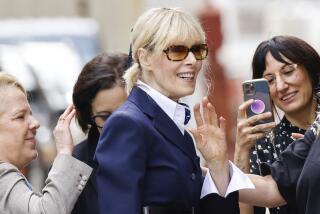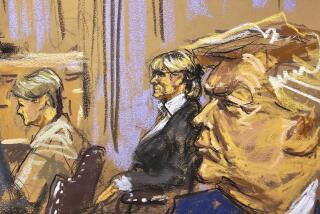Higher Profile for Rape Retrial?
- Share via
The retrial of three young men accused of raping an allegedly unconscious girl on videotape in Orange County could draw even more attention than the original proceedings -- in part because of public outrage over the first jury’s unwillingness to convict, some legal experts say.
Already, one group plans to demonstrate in support of the alleged victim during Friday’s arraignment, during which prosecutors will announce whether they will try the three separately or alter the charges to improve chances of conviction.
Bucking the trend of many high-profile criminal cases, “public interest hasn’t waned at all,” said former federal prosecutor Laurie L. Levenson, a professor at Loyola Law School in Los Angeles. “Before, the case was sort of a fascination; now it’s taken on some symbolism and become more of a community cause to help the alleged victim.”
The jurors who deadlocked had been leaning toward acquittal on nearly every count, a result that triggered a flood of criticism on talk radio, on Internet message boards and in letters to local newspapers.
Defense lawyers say they aren’t concerned about the attention affecting the second trial. Some legal analysts counter that apparent public scorn for the first set of jurors will make it difficult to find a second panel of people who are both unfamiliar with the case and willing to put their reputations on the line.
Meanwhile, jurors from the first trial said the criticism had left them baffled. Even the lone juror who believed that the defendants were guilty on nearly every count said it irritated her that so many people rushed to judge the case despite not being in court to hear the evidence.
Prosecutors have revealed little about how they would approach the second trial and what charges would be filed this time against Gregory Scott Haidl, Keith James Spann and Kyle Joseph Nachreiner, all now 19. In the first case, the trio faced 24 charges of rape and assault in the 2-year-old incident involving a then-16-year-old girl at the Corona del Mar home of Haidl’s father, an Orange County assistant sheriff. The defendants were under 18 at the time of the incident.
In the new trial, legal experts said, prosecutors could file fewer charges, concentrating on the ones they think are easiest to prove -- or perhaps try the defendants separately.
Either way, said those familiar with the case, retrials tend to favor prosecutors because they can use their familiarity with the defense’s case to adjust their witness list and how evidence is presented.
Haidl’s attorney, Pete Scalisi, said he wasn’t worried about a community backlash but added that the publicity since the mistrial provided ample grounds for recusing county prosecutors from the case and possibly moving the trial to another county.
In a news conference after Gregory Haidl was targeted with a new, unrelated sex allegation -- misdemeanor consensual intercourse with a minor he met at a party the night of the mistrial -- Orange County Dist. Atty. Tony Rackauckas called Haidl “a threat to do the same thing to other young ladies.”
“Those statements were uncalled-for and inflammatory and incendiary,” Scalisi said. “My client was trying to have a normal teenage life, doing what goes on in lovers’ lanes every night. It’s absurd to characterize him as a threat to the public.”
Some people aren’t waiting for a second trial to make their decision.
“The defendants ... were unquestionably guilty,” declares a website called Justice for Jane Doe. The site provides form thank-you letters to send to the district attorney’s office and the alleged victim’s civil attorney. The woman, now 18, has been referred to as Jane Doe throughout the court proceedings.
Gail Schwartz, 23, of Lake Forest, an organizer for Friday’s protest in front of the Santa Ana courthouse, said it horrified her that other people she talked to weren’t more upset about the first trial’s outcome. She and others who share her sentiments have sent fliers announcing the demonstration to Southern California feminist groups.
“We want the community to understand that this case is a big deal and that this woman needs justice,” Schwartz said. “When one of the defendants has a high-placed father, it opens the system up to a lot of corruption. The victim deserves a fair trial.”
Jurors should take their cue from such outrage, said Jane Doe’s civil attorney, Sheldon Lodmer. He said jurors should try to be more objective and do a better job of following the judge’s instructions.
“The defense lawyers did a lot of strange things, and maybe improper things, but they were representing their clients,” he said. “It’s a sad commentary that those jurors overlooked the evidence and were swayed.”
The holdout juror, Caroline, 32, a personal trainer who did want her last name used, described the 11 hours of deliberations as an exercise in frustration.
“Every time we’d see the video again, I’d hope that maybe this time they’d finally get it,” she said. “I just couldn’t understand how we’d be watching the same video and seeing two totally different things.”
But Jeff, 39, a juror who also didn’t want his last name used, had said after the mistrial was declared that defense attorneys made him question Jane Doe’s credibility through their cross-examination.
“It’s very evident in a number of areas that she is lying,” he said. “It was less what the defense said about her and more what she did to herself on the stand.”
Caroline said the publicity surrounding the case since the mistrial was declared June 28 would make it even harder to find objective jurors.
“Everyone seems to think they know a lot about the case, and they assume the boys are guilty,” she said. “But without seeing the video or having all the evidence, I don’t think it’s anyone’s place to say I or anyone else did the right thing or wrong thing.”
Scalisi, Haidl’s lawyer, said that because the case has aroused such passions, it tests the concept of innocent until proved guilty.
“The jurors who sat on the first trial were able to see the striking differences between the commentary on talk radio and what actually happened in court,” Scalisi said. “I believe that anyone who sits on the next jury will also be conscientious, coming to a fair decision without being unduly influenced by the public outcry.”
More to Read
Sign up for Essential California
The most important California stories and recommendations in your inbox every morning.
You may occasionally receive promotional content from the Los Angeles Times.










